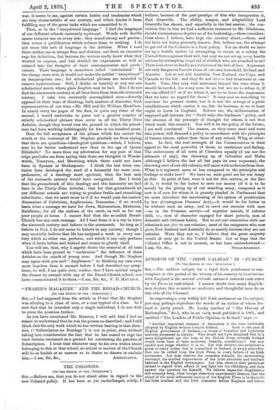THE COLONIES.
[TO THE EDITOR OF THE " SPECTATOR:1
Sin,—Believe me, that you do not stand alone in regard to the new Colonial policy. It has been as yet unchallenged, solely, I
believe, because of the past prestige of him who inaugurates it, Earl Granville. The ability, temper, and adaptability Lord Granville has shown, and especially in the last session ; the con- viction that in him we had a sufficient successor to Mr. Gladstone, should circumstances deprive us of his leadership,—these considera- tions alone, I believe, have kept the country silent,—these, and the facts not being generally known. But, believe me, the attempt to get rid of the Colonies is a fatal policy. For no doubt we have set up a hostile nation by attempting to retain as a colony the United States against their will, but may we not set up many hostile nations by attempting to get rid of children who are attached to us? There is no error so deadly as a violation of the law of love. At present our only dangerous foes are those of our own household, Ireland and America. Let us not add Australia, New Zealand, the Cape, and Canada to the list ; and they do not deserve bad treatment at our hands. True, they may wish assistance beyond the time when it should be needed, too many sons do so, but are we to refuse it, if we can afford it? or if we refuse it, are we to leave the impression that we have no regard for them? It may cost us something to continue the present course, but it is not the savings of a great establishment which carries it on, but its business, as we at least ought to know in England. Believe me, the utilitarianism of supposed self-interest, the " Devil-take-the-hindmost" policy, and the absence of the principle of thought for others, is not that which made this country. Nor will it be the policy of the future, I am well convinced. The masses, as they come more and more into power, will demand a policy in accordance with the principles of human nature, rather than those of any school, Whig or other- wise. In fact, the real strength of the Conservatives is their appeal to the most powerful of these, to sentiment and feeling. The endowment of all sorts of Churches equally (I am not the advocate of any), the throwing up of Gibraltar and Malta (although I believe the last all but pays its own expenses), the throwing over of our old colonies, will meet with no favourfrom them. What is a regiment more or leas compared to the principles and feelings at stake here? We have no such good use for our Army as this. In point of fact, were it not for this service, or the like of it, it would be far better to save our money (if it is to be saved) by the giving up of our standing army, composed as it now is of men for whom it is gravely pleaded in Parliament that we must introduce the sanctioning of the system of prostitution by law (Contagious Diseases' Act),—it would be far better to be without such an army, and to meet our enemies with men —as in the Prussian service—of superior morale, if inferior drill, i.e., men of character engaged for short periods, men of domestic and virtuous habits. But to cut our connection with our colonies is not fair to our colonies ; most of the emigrants who now go to New Zealand and Australia do so mainly because they are our colonies. Were they not so, I believe that the great majority would at once go to the United States. Let us hope that the Colonial Office is not in earnest, or has been misunderstood.—


































 Previous page
Previous page